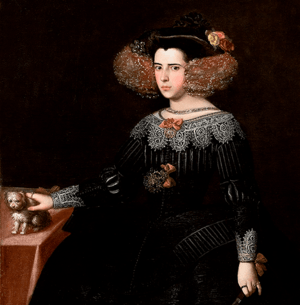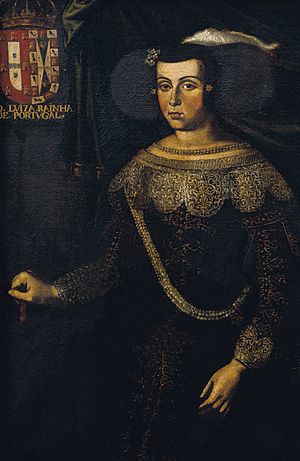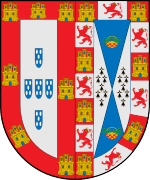Luisa de Guzmán facts for kids
Quick facts for kids Luisa de Guzmán |
|||||
|---|---|---|---|---|---|

Portrait attributed to Alonso Cano, 1632
|
|||||
| Queen consort of Portugal | |||||
| Tenure | 1 December 1640 – 6 November 1656 | ||||
| Regent of Portugal | |||||
|
Regency
|
6 November 1656 – 22 June 1662
|
||||
|
Monarch
|
|||||
| Born | 31 October 1613 Sanlúcar, Spain |
||||
| Died | 27 February 1666 (aged 52) Lisbon, Portugal |
||||
| Burial | Pantheon of the Braganzas | ||||
| Spouse | João IV of Portugal | ||||
| Issue |
|
||||
|
|||||
| House | Medina Sidonia | ||||
| Father | Manuel de Guzmán y Silva, 8th Duke of Medina Sidonia | ||||
| Mother | Juana de Sandoval y la Cerda | ||||
| Religion | Roman Catholicism | ||||
| Signature |  |
||||
Luisa María Francisca de Guzmán y Sandoval (born October 13, 1613 – died February 27, 1666) was an important queen of Portugal. She was married to King John IV, who was the first king from the House of Braganza. Luisa was also the mother of two future kings of Portugal, Afonso VI and Peter II. Her daughter, Catherine of Braganza, became a queen of England. Luisa served as the regent of Portugal, meaning she ruled the country for her son, from 1656 until her death in 1666.
Contents
Biography of Queen Luisa
Early Life and Marriage
Luisa was born in Spain in 1613. Her parents were Juan Manuel Pérez de Guzmán, 8th Duke of Medina Sidonia, and Juana Lorenza Gomez de Sandoval y de la Cerda. Her family was very powerful in Spain.
In 1633, Luisa married John, who was the 8th Duke of Braganza in Portugal. At this time, Portugal was ruled by Spain, a period known as the Iberian Union.
Role in the Portuguese Restoration War
Even though she was Spanish, Luisa was very ambitious and strong-willed. She played a key role in Portugal's fight for independence from Spain in 1640. This conflict is known as the Portuguese Restoration War.
Luisa strongly encouraged her husband, John, to accept the throne of Portugal. She believed Portugal could win its freedom. When people warned her about the dangers of becoming queen and facing Spain's power, she famously said:
Antes Rainha um dia que Duquesa toda a vida.
Rather Queen for a day than Duchess all my life.
Some sources say she used the words "for an hour" instead of "for a day." This quote shows how determined she was.
In 1641, there was a plot to kill King John. Luisa was among those who supported punishing the nobles involved, like the Duke of Caminha.
Luisa's Time as Regent
After her husband, King John IV, died in 1656, Luisa became the Regent of Portugal. This meant she ruled the kingdom because her son, Afonso VI, was still too young. She continued to be regent even after Afonso became an adult in 1662. This was because her son had mental health issues and was not able to rule effectively.
Luisa was a very smart politician. She worked hard to protect Portugal's freedom and independence. She controlled the government firmly. She worried about her eldest son's ability to rule and hoped her younger son would eventually become king.
She was also responsible for making an important alliance with England. Her daughter, Catherine, married Charles II of England, which strengthened Portugal's position. Luisa is also praised for organizing the armies that helped Portugal win its independence in the Portuguese Restoration War.
Children of Queen Luisa
Luisa and King John IV had several children:
- Infante Teodósio, Prince of Brazil (1634 – 1653): He was the heir to the throne but died young and unmarried.
- Ana of Braganza (1635): She died at birth.
- Infanta Joana, Princess of Beira (1635 – 1653): She also died young and unmarried.
- Catherine of Braganza (1638 – 1705): She married Charles II of England and became Queen of England. She had no children who survived.
- Manuel of Portugal (1640): He died at birth.
- Afonso VI of Portugal (1643 – 1683): He became King of Portugal. He married Maria Francisca of Savoy.
- Pedro II of Portugal (1648 – 1706): He also became King of Portugal. He married Maria Francisca of Savoy (after his brother Afonso died) and later Maria Sophia of Neuburg. He had children with both wives.
See also
 In Spanish: Luisa Francisca de Guzmán para niños
In Spanish: Luisa Francisca de Guzmán para niños
 | Valerie Thomas |
 | Frederick McKinley Jones |
 | George Edward Alcorn Jr. |
 | Thomas Mensah |



